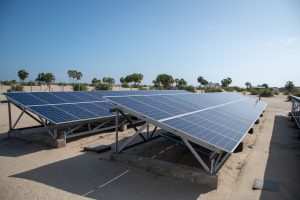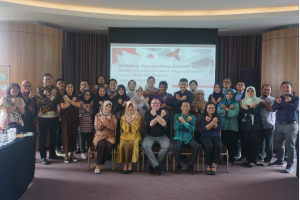Energy Island Solutions
"Empowering Indonesia's Archipelago with Clean, Resilient Energy"
Energising Indonesia’s diverse islands with tailored, sustainable energy solutions that bolster local economies and combat climate change.
Mission Statement
GIZ supports the Government of Indonesia (GoI) in shaping strategies for the implementation of the energy transition in remote/island regions, and to increase exchange through triangular approaches. The beneficiaries are local communities and the entire transformed rural regions.
Why?
With more than 17,000 islands, Indonesia is a large archipelago that needs unique solutions to increase access to modern energy. With more than 600 grids, various solutions adapted to local circumstances need to be developed to create resilience in mitigating climate change, while developing the local economy. Fast tracking solutions that rely on fossil-based energy such as diesel-based generation are proven to be more expensive to operate, and potentially contributing to environmental problems. At the same time, there are gaps that need solutions to meet dissimilar needs e.g., adding product values, expanding services, and other needs. Adding Indonesia’s abundant natural resources to the equation, innovations that are based on renewable energy (RE) play an important role in ensuring low carbon development in Indonesia. Through past RE mini-grid roll-outs in Indonesia, there is significant experience in planning and running RE-based Mini-Grids, which provides the opportunity for cross-national learning and knowledge exchange with other countries that face similar decentral energy challenges like Indonesia’s many small and remote islands.
What?
The Government of Indonesia has declared the strategy to low carbon economy through the National Mid-Term Development Plan 2020 – 2024. In that strategy, RE shall play a significant role for remote regions to boost economic transformation. This is aligned with the government’s targets to increase energy access to ensure a 100% electrification ratio by 2023, and a share of 23% RE in the energy mix by 2025 (44% by 2030 as part of the Just Energy Transition Partnership, JETP). For rural regions, the GoI has set a 2024 target to transform 10,000 disadvantaged villages to become developing villages, and 5,000 developing villages to become self-sufficient villages, also in terms of energy self-sufficiency.
Beyond the local scope, south-south triangular cooperation is one of key strategies to boost trade and investments. For that purpose, Indonesia has established IndonesianAID which is an institution to manage funds for international development cooperation (300 billion IDR in 2023). IndonesianAID aims to build capacities and support concrete project implementation in the field of decentralised energy experience and knowledge exchange, herewith looking to draw upon Indonesia’s rich experience building more than 1,000 RE mini grids.
With whom?
How?
Different instruments are used to implement innovative island energy solutions, including:
- Provision of policy advice on the implementation and integration of small scale (beyond off grid) RE solutions for EBTKE/MEMR
- Aligned with policy advice, technical studies are undertaken, collecting facts and figures from the field,
- Technology Innovation and Private Sector Collaboration to fill knowledge gaps and provide sustainable, innovative solutions
- Organisation of inclusive stakeholder dialogues to ensure full participation of affected groups
- Knowledge management for decentralised energy solutions in support of MEMR
- South-south Triangular cooperation to share the knowledge and experiences from Indonesia to other regions which will strengthen the position of Indonesia as a key global development partner.
When?
- Number of International corporations in the field of RE implementation both standalone and grid integrated
- Number of IndonesiaAid contribution to triangular cooperation project
Who?
- Topic leads: Catoer Wibowo, Frank Stegmüller
- Thematic Experts: Erwina Darmajanti, Atiek Fadillah (rural electrification), Neni Marlina (Gender Expert)



